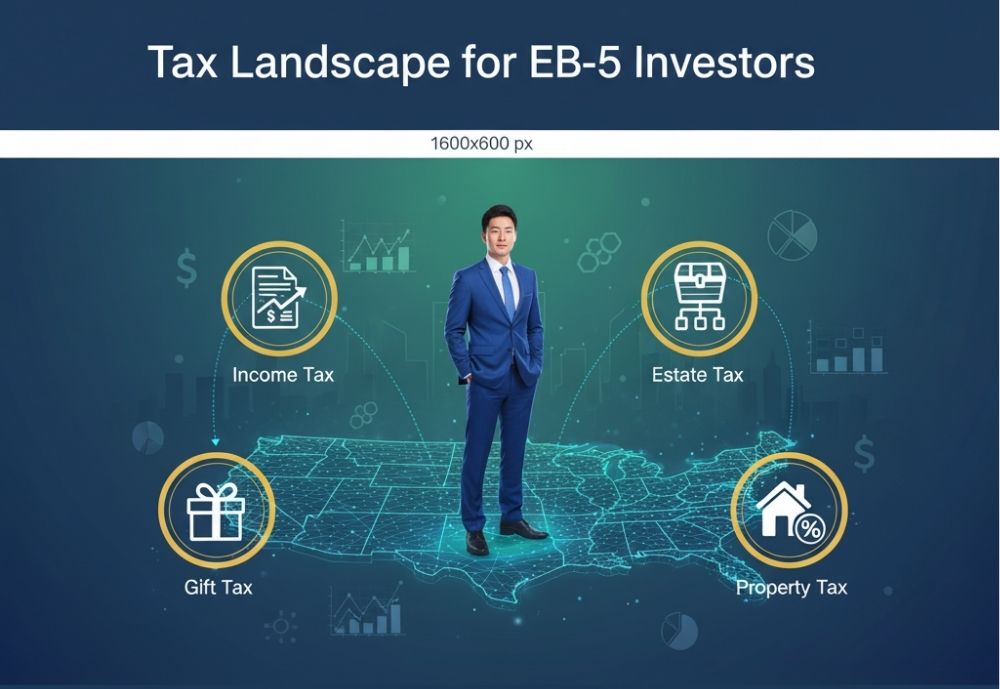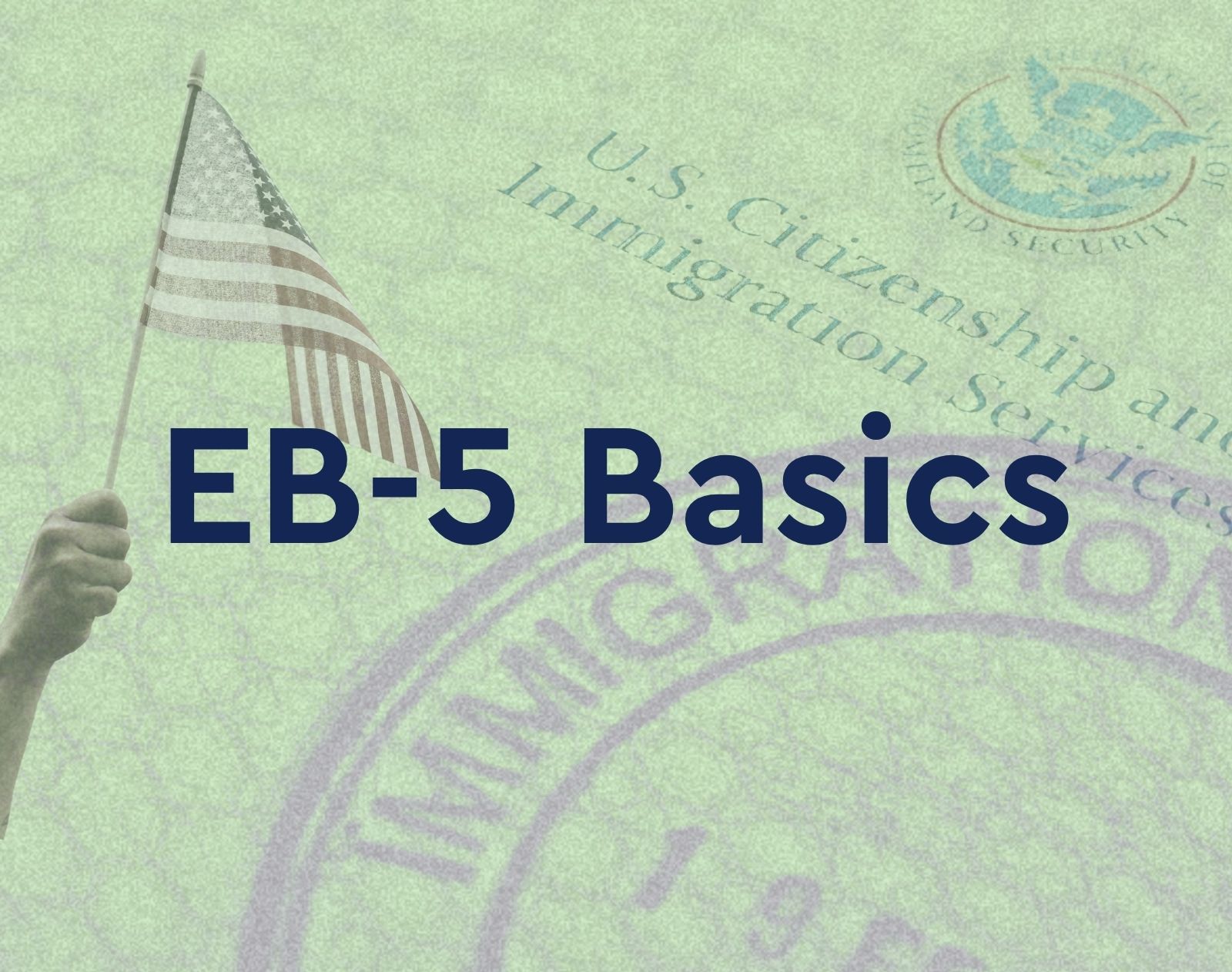EB-5 Investors
Post Investment Guidance for EB-5 Investors - AIIA
Information for EB-5 Investors to consider such as Taxes and Foreign Travel
The advent of paying U.S. taxes is one of the least attractive and most forgotten parts of an EB-5 investor’s immigration process. Yet all U.S. residents must file annual tax returns in accordance with the standards set by the IRS, who strictly monitors compliance with U.S. tax code. While the process of filing U.S. taxes is arduous, the organization of financial affairs in multiple countries and paying taxes on those assets is even more complex.
Working with a Certified Public Accountant (CPA) or tax attorney with knowledge of the EB-5 program and experience with past investors is the best way to ensure that all assets are accounted for and that the immigration process will not be affected by unintentional tax evasion charges.
U.S. tax requirements for EB-5 investors are complex, given investors in the program are required to make a large investment in the U.S. economy, change residence status, and eventually have their investment repaid to them. Tax liability may even apply to petitioners prior to conditional permanent residency in the U.S, meaning EB-5 immigrants should be preparing for U.S. tax returns early into their EB-5 process, far before they plan to enter the country
Educating yourself of potential tax liabilities, and understanding the basics of the U.S. tax code is one of the best ways to prepare yourself prior to a first consultation with a professional.
AIIA can refer you to a skilled CPA or Tax Attorney with deep understanding of the EB-5 investment process and can expertly guide you through U.S. tax codes.
For EB-5 Investors
Resources For Post Investment Guidance for EB-5 Investors

U.S. Taxes for EB-5 investors: The Basics
EB-5 investors become U.S. tax residents upon obtaining green cards, paying taxes on worldwide income, gifts, estates, and property per IRS rules and tax treaties.
Learn More
U.S. Taxes for EB-5 investors: Pre-immigration tax planning
EB-5 investors should plan pre-immigration tax strategies, optimize asset ownership, understand real estate structures, and leverage tax treaties with professional CPA guidance.
Learn More
U.S. Taxes for EB-5 investors: Filing your taxes
EB-5 investors must obtain an SSN or ITIN and file annual U.S. tax returns; professional tax advice is recommended due to complex regulations.
Learn More
Identification for New Immigrants
New immigrants should secure a green card, SSN, and driver’s license or ID to navigate U.S. life and travel with fewer complications.
Learn More
The importance of Reentry Permits for EB-5 investors
Reentry permits allow EB-5 investors to travel or live abroad for up to two years without jeopardizing their U.S. permanent resident status. Applying early is essential due to long processing times.
Learn More
U.S. Health Insurance System and EB-5 immigrants
U.S. health insurance is private, costly, and essential. EB-5 investors should explore coverage options early to avoid high medical expenses and access necessary care.
Learn More
Optimizing your Credit Score as a new EB-5 immigrant
Build U.S. credit by using secured or basic credit cards, on-time payments, and tradeline reporting; transferring foreign credit history is rarely automatic.
Learn More
Easing Travel for EB-5 investors: Overview of Global Entry, TSA Pre, Nexus and Sentri
Trusted Traveler Programs like Global Entry, NEXUS, and SENTRI offer expedited travel for EB-5 immigrants with valid green cards and frequent international movement.
Learn More
Other things to consider after doing your EB-5 investment
Track your investment, register for Selective Service if applicable, never falsely claim U.S. citizenship, and join EB-5 social groups for support.
Learn More
U.S. Taxes for EB-5 investors: The Basics
EB-5 investors become U.S. tax residents upon obtaining green cards, paying taxes on worldwide income, gifts, estates, and property per IRS rules and tax treaties.
Learn More
U.S. Taxes for EB-5 investors: Pre-immigration tax planning
EB-5 investors should plan pre-immigration tax strategies, optimize asset ownership, understand real estate structures, and leverage tax treaties with professional CPA guidance.
Learn More
U.S. Taxes for EB-5 investors: Filing your taxes
EB-5 investors must obtain an SSN or ITIN and file annual U.S. tax returns; professional tax advice is recommended due to complex regulations.
Learn More
Identification for New Immigrants
New immigrants should secure a green card, SSN, and driver’s license or ID to navigate U.S. life and travel with fewer complications.
Learn More
The importance of Reentry Permits for EB-5 investors
Reentry permits allow EB-5 investors to travel or live abroad for up to two years without jeopardizing their U.S. permanent resident status. Applying early is essential due to long processing times.
Learn More
U.S. Health Insurance System and EB-5 immigrants
U.S. health insurance is private, costly, and essential. EB-5 investors should explore coverage options early to avoid high medical expenses and access necessary care.
Learn More
Optimizing your Credit Score as a new EB-5 immigrant
Build U.S. credit by using secured or basic credit cards, on-time payments, and tradeline reporting; transferring foreign credit history is rarely automatic.
Learn More
Easing Travel for EB-5 investors: Overview of Global Entry, TSA Pre, Nexus and Sentri
Trusted Traveler Programs like Global Entry, NEXUS, and SENTRI offer expedited travel for EB-5 immigrants with valid green cards and frequent international movement.
Learn More
Other things to consider after doing your EB-5 investment
Track your investment, register for Selective Service if applicable, never falsely claim U.S. citizenship, and join EB-5 social groups for support.
Learn MoreDirectory of Professionals

AIIA has curated a list of the top professionals from attorneys, investment specialists, to business plan writers to support all EB-5 stakeholders.
View Directory of ProfessionalsConnect With A Professional
AIIA has curated a list of the top professionals from attorneys, investment specialists, to business plan writers to support all all EB-5 stakeholders
For Developers, Business Owners, and Govs
More Resources
Can't Find The Right Resource
Use this tool before to find the most applicable EB-5 resource for your needs.
Get In Touch With Us
If you have any questions, inquiries, or collaboration proposals, please don’t hesitate to reach out to us.

